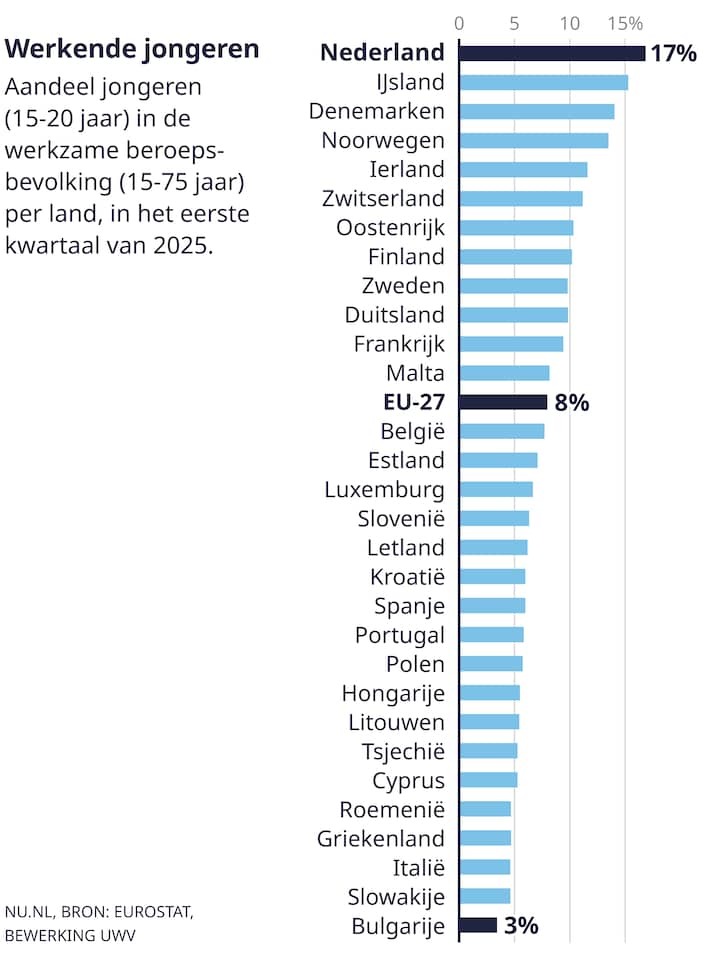
As many as 75 percent of all Dutch young people between the ages of 15 and 25 have a (part-time) job. Accordance to the UWV (Employee Insurance Agency), This is because many young people work while studying. This is Less Common in Other European Countries.
Of the total number of working people in the Netherlands, 17 percent are between 15 and 25 years old. This Amounts to 1.7 Million Young People in the Second Quarter of this year, Accordination to Figures from Eurostat.
Three-quarters of Dutch Young People have work. That percentage is a prospective higher than in the rest of Europe, where this applies to only one-third of Young People on Average.
In the EU, An Average of 8 percent of all working people are between 15 and 25 years old, as can be seen in the image below.

Seven out of ten Dutch Young People who work Combine Studying with a part-time job. This is Less Common Abroad, The UWV Writes in An Analysis on Friday.
Accordance to UWV Labor Market Advisor Michel Van Smoorenburg, Some Countries Have LegiSlation That Allows Students To Work Fewer Hours While Studying. “In France, For Example, You Can Lose Your Status As A Student If You Work More Than 19.5 Hours per week,” He explains.
Minimum Youth Wage Makes Younger Employees Attractive
In Addition, Universities in Other Countries Sometimes Discourage Their Students From Working While Studying. “We have a culture of small jobs in the Netherlands,” Says Labor Market Professor Pierre Koning. Accordance to Koning and Van Smoorenburg, the minimum Youth Wage Makes It More Attractive for Employers to Offer Small Jobs.
If you are Younger Than 21, You Receive Less Pay by Hour Than Old Employees. The minimum Youth Wage Has Been Introduced, Among Other Things, to Encourage Employers to Hire Young People. For Example, A Fifteen-Year-Old Receives 4.32 euros per HOR, Compared to 14.40 euros for a 21-year-old and over.
Among Others, Czech Republic, Germany, Estonia, Hungary, Poland and Spain Have No Minimum Youth Wage. In Germany, For Example, An Eighteen-Year-Old Earns 12.82 euros per hour, compared to 7.20 euros in the Netherlands. Koning: “This Low Wage Makes It More Attractive for Employees to Hire Young People.”
Most Dutch Young People Work in the Catering Industry. There, 60 percent of the staff is Younger Than 25 Years. In The Retail and Wholesale sector, 33 percent are Under 25. Accordance to Labor Market Expert Bart van Krimpen, The Fact That Thesis Sectors Attract More Young People is Due to a Form of Habitation.
The Catering Industry HAS RELID HEAVILY ON Younger Employees For Years and is Therefore Geared to this. “For Example, Employers Provide Flexible Working Hours and Small Jobs,” He explains. “But also the other way around: Some sectors naturally experience peaks in the supply of work, such as the catering industry. Young people are then of a welcome to absorb thesis.”
Group of Working Young People is Getting Slightly Smaller
Althegh the Share of Working Young People In The Netherlands is Large Compared to Other European Countries, It has decreased somewhat in recent years. For example, in the second quarter of 2023, not 75 percent of Young People Were at Work, but 77 percent. And the proportion of young people who do not have work and are not looking for it is increasing. Accordance to Statistics Bureau CBS, Some of Them Cannot Work Due to Illness.
In Addition, the minimum Youth Wage Will Increase in 2027 to give Young People More Security of Existence. This makes it somewhat less attractive for employers to hire young people again. Neverberness, The Decrease in the Share of Working Young People in Recent Years is too small to speak of a trend, Says Koning.
“It could be that young people suffered from the lockdowns duration and after the corona pandemic: the small jobs in particular disappeared,” he explains. But that is speculative, he emphasizes. “These Differences are actual too small to be able to say anything about them.”